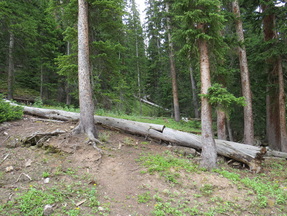 This past week I had the joy and challenge of a vacation in the mountains of Colorado. It was a joy because of the grandeur of the mountains and the abundant life around me. It was a challenge because I have lived most of my life at sea level and so it was difficult to acclimate to an altitude of over 9,000 feet. Yes, the air is fresh, but it lacks the amount of oxygen I am used to breathing. I want to say I fully acclimated, but puffing though climbing a few flights of stairs all week provided proof I had not. However, I did hike near the top of the mountain which was between 11,000 and 12,300 feet. The trick was in slowing down rather than in trying to go my usual fast pace. The beauty of slowing down was that I was forced to notice a lot more than I would have had I been able to rush to the destination. There was much beauty to behold, so slowing down helped me to truly savor it. I guess there is much to be said for less oxygen. It actually provided more clarity. One of the hikes took my husband and I up a gravel roadway past patches of forest punctuated by clearings which are ski runs during the winter. After a delightful stay at the top of the trail, we began our descent. On the way down I noticed trees which had fallen in the midst of the healthy forestation and chuckled as I thought of the old Zen koan:* "If a tree falls in the forest and nobody is there to hear it, does it make a sound?" I smiled at that for a moment or two and then began to really think about it. While one could playfully argue both sides of the conundrum, debating it would be missing the point. The issue should focus not on the sound the tree might make in falling, but that God is aware that it fell, regardless of whether any human was there to witness the event. In other words, nothing escapes God's notice. He is aware of every tree that falls, every creature who cries out to Him in praise or in desperation. 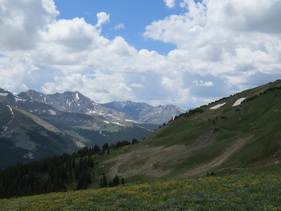 When we hiked on the mountain it was as if we were totally alone, but the beauty of our surroundings gave witness to our Creator. The mountains sang of His presence, not just in memory of His creating them, but in their present beauty. There was a lesson even in witnessing a dead tree. The decomposition of trees is life-giving for all sorts of creatures, seen and unseen. Life is present all around, even in the things that seem dead. Life that did not at first glance seem like life at all was actually abundant and verdant. This is the Gospel message: we never lose hope because out of death comes new life. Jesus came into the world to give life so that we could live it to the full, (paraphrase of John 10:10.) He healed people everywhere He went. He brought new life to the diseased, the possessed, the injured, and the dying. He even gave life to a dead man. He brought new life through His preaching and teaching. He brought it in loving all sorts of people that no one else would even go near. No one was beyond His love and His efforts to share the Good News. The culmination of this was in giving us His body and blood which give life in a way that is beyond our comprehension. In death there was, and is, incredible life. The One who conquered death gives new life continually. That is the beauty of our God. He never stops giving us new life. When we need it most, He takes that which seems dead (or nearly dead) and restores it. He does not merely resuscitate us, breathing a bit of air into our oxygen-deprived ‘spiritual lungs’ to give us a jump start. Rather, he gives us better life, and life which will someday be eternal. If we are truly attentive to the gift He offers we realize that the new life is deeper and fuller than what we had before. 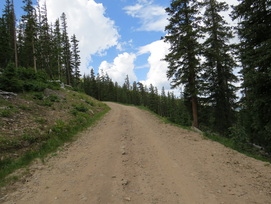 The deepest mystery, then, is the new life that comes through suffering. This is the most difficult to see because it can be the most deeply hidden. But in suffering there is much to learn and much to discover in ourselves and in God. We can learn that we are never alone and we can discover strengths within ourselves that we never knew we had. We can learn that Jesus is indeed with us, since He knows intimately what suffering is about, having suffered so terribly during His own life on earth. We can learn the depths of prayer as we cry out for help in our pain. And we can learn to co-exist with mystery, since suffering is beyond understanding much of the time. 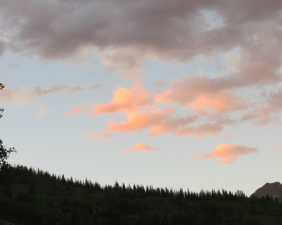 We can also learn to be compassionate with the suffering of those around us. Just as in the forest it is easy to miss the potential for new life when we think something is dead, it is easy to mistakenly think some people are beyond healing. Or we see that the suffering is so deep that we feel overwhelmed, unable to know how we could possibly alleviate something so big and beyond us. But it is through the gift of compassion that we can make a difference. Many people who suffer do not have anyone to show them that suffering is not an exile. That is, they do not know that Love is present unless someone personifies it for them. How do we expect those suffering to really know God hears their cries if we do not attend to them? If we do not bring caring love how would they know that God hears their pleas, just as He hears that tree falling in the forest? God wants the suffering to know He is near, but most of the time He needs us to be the agents of His care, the bearers of His message. Oh yes, God could swoop down and heal everyone with one proverbial snap of His fingers. We would learn nothing and expect everything to be handed to us all the time if this was the case, and the result would be that we would appreciate nothing. If our world was not broken we would not need healing. If the world did not need healing God would not have sent His Son. It is and He did, that is the reality. But the story does not end there. When Jesus rose to Heaven, He left a very powerful force to continue His work: He left us, Spirit-filled, as His disciples so that we could continue to bring the healing that is needed in our world. He has outfitted us, so to speak, with all the gear we need to bring healing into the world. He has given us graces, incredible powers, including faith, hope, and love, which overflow into the world every time we live the message of His Gospel. He has given us numerous gifts so that we might take the message to the lonely and the broken that do not necessarily have to be in far-off places. Many times they are in our own cities, neighborhoods, and our own families. And of course, we, too, are broken. 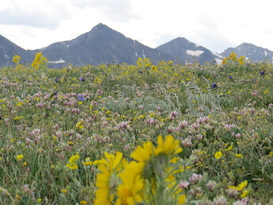 That is the wonder of it all: we are broken, but we can be instruments of healing. And in going forth with love and care for others we also heal ourselves. Therefore, let us realize that God does know our every movement and is with us every moment of the day; we do not go alone. Let us remember that He does hear every silent plea and every cry of help that goes out to Him, but that often He needs us to help Him answer those prayers by being His instruments of love. Some people do not listen to Him, or they do not know how, and some people are very different than we would choose to be and so we find reaching out to them difficult, but that does not mean we are to stop loving them. Rather we are to imitate the Lord and listen carefully in order to hear the way He hears. Let us be attentive to the tree that falls, so to speak, so that we may be there to be instruments of new life, bringing love through our actions and through the unseen gift of prayer for those who do not even know we are praying for them. That is the way of Love. It often comes in silence and mystery. So yes, the tree that falls in the forest is heard because it is never really alone. May we trust that the Father is aware of us at every moment of the day! May we call upon Jesus to help us when we are in need and when we need Him to help us help others! May we be empowered by the Holy Spirit to use the gifts given to us knowing that we can ask for the specific graces we need! May we have gratitude for the beauty of the earth! And may we have the courage to be instruments of love and healing! Let us continue to meet in the heart of Jesus! Peace! ©Michele L. Catanese *Koan: “a paradox to be meditated upon that is used to train Zen Buddhist monks to abandon ultimate dependence on reason and to force them into gaining sudden intuitive enlightenment.” Definition found at http://www.merriam-webster.com/dictionary/koan All the photos are mine. They were taken on Copper Mountain in Colorado. They were shot on various trails at upwards of 11,000 feet elevation except the one of the sky at dusk. That was taken at approximately 9,300 feet in the village at Copper Mountain. Comments are closed.
|
Heart Speaks to Heart
|

 RSS Feed
RSS Feed

